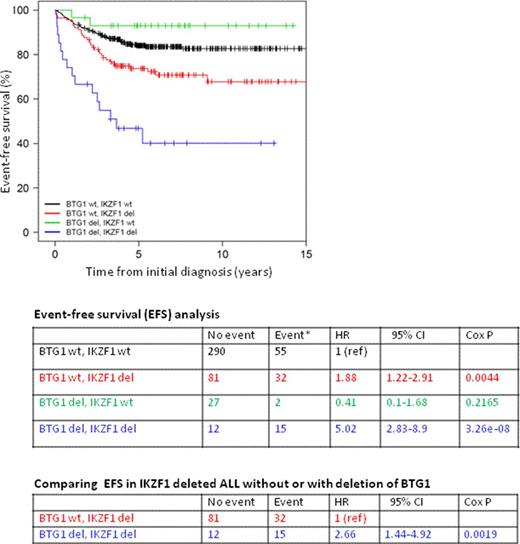Abstract
Deletions and mutations affecting transcription factor IKZF1 are associated with increased relapse risk and poor outcome in B cell precursor acute lymphoblastic leukemia (BCP-ALL). However, additional genetic events may either enhance or negate the effects of IKZF1 on prognosis. We observed that deletions of the gene encoding the transcriptional coregulator BTG1 frequently co-occured with loss of IKZF1 function, suggesting a synergistic role for these events during leukemia development or progression. Targeted deletion of Btg1 predisposed both Btg1+/- and Btg1-/- mice to T cell malignancies, similar to what has been observed in Ikzf1 heterozygous knockout animals. Hence, while somatic single single-copy losses of either BTG1 and IKZF1 in the patient are predominantly found in BCP-ALL, targeted deletion of these genes in the mouse gives rise to T cell malignancies.
To establish whether loss of BTG1 function affected the tumor suppressive role of IKZF1, the Btg1 knockout allele was crossed onto mice heterozygous for a loss-of-function Ikzf1 allele. Leukemia penetrance in these compound mice increased in a Btg1 dose-dependent manner. These leukemias were characterized by clonal TCRb rearrangement and aggressive infiltration into secondary organs, indicating synergistic roles for these tumor suppressors during mouse leukemia development.
To investigate the effects of combined IKZF1/BTG1 loss in human BCP-ALL, we examined a large pediatric cohort of BCP-ALL cases, and found that the combined presence of BTG1 and IKZF1 deletions was associated with a markedly higher incidence of relapse, relative to IKZF1-deleted cases without BTG1 aberrations. Similar to BTG1 copy number losses, deletions in EBF1, PAX5, RB1 and CDKN2A/B appeared to be selectively enriched in IKZF1 deleted ALL. However, in contrast to BTG1, none of these other copy number alterations affected relapse incidence or outcome in this patient group. In conclusion, our data demonstrate synergy between the tumor suppressors BTG1 and IKZF1 during mouse leukemia development while the combined (single copy) loss of these two tumor suppressors identifies a patient group with an extremely poor outcome.
Event free survival in a cohort of 514 children newly diagnosed with BCP-ALL, divided into four categories based on IKZF1 and BTG1 deletion status.
Combined loss of IKZF1 and BTG1 predicts poor outcome in BCP-ALL
Combined loss of IKZF1 and BTG1 predicts poor outcome in BCP-ALL
Pieters:Eusa Pharma: Consultancy, Honoraria, Membership on an entity's Board of Directors or advisory committees.
Author notes
Asterisk with author names denotes non-ASH members.


This feature is available to Subscribers Only
Sign In or Create an Account Close Modal